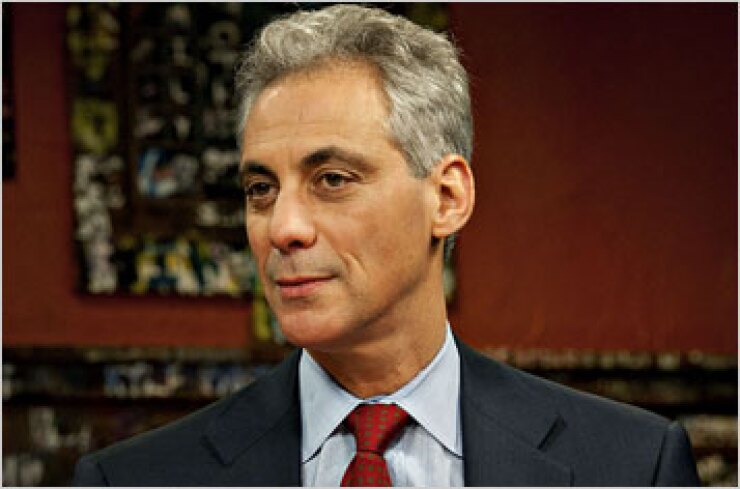
CHICAGO — Chicago Mayor Rahm Emanuel won a second term Tuesday, fending off his rival Jesus "Chuy" Garcia after casting him as ill-prepared to tackle the city's deep fiscal woes.
Emanuel took nearly 56% of the vote to turn aside the challenge from Garcia, a Cook County board commissioner who previously served as a state senator and city council member.
Emanuel, a former congressman who served as chief of staff to President Obama, struck a humble tone in his victory speech after a hard fought contest in which his rival sought to cast him as the candidate who represented business interests over the general populace.
"To the second city that voted for a second term and a second chance, I have had the good fortune to serve two presidents. I have had the good fortune of being elected to Congress," Emanuel told a crowd of supporters. "Being elected mayor of the city of Chicago is the greatest job I've ever had and the greatest job in the world. I'm humbled by the opportunity to serve you."
The city's troubled fiscal condition — illustrated by its battered credit ratings, a looming $550 million public safety pension spike, and a $300 million to $400 million budget deficit — emerged as a central theme during the city's first-ever run-off since establishing a general municipal election in 1999.
That marked a shift from the February race during which the more prominent issues among the four candidates challenging Emanuel were controversial school closures, anger over flaws in the city's red light camera program, and neighborhood crime.
Emanuel fell just shy of capturing a majority to win outright in February and was forced into a runoff against Garcia, the second highest vote-getter, in a contest closely followed by market participants worried about the city and school district's solvency.
Moody's Investors Service's decision to drop Chicago down one level to Baa2 over its pension pressures in late February followed by its two-notch downgrade of the Chicago Board of Education to Baa3 helped push finances to the forefront.
Both downgrades triggered swap termination events underscoring the severe distress both credits face as the city grapples with $19 million of unfunded pension obligations and the schools a $9.5 billion tab. The district's credit is also pressured by a looming $1.1 billion deficit and governance ties to Chicago, according to Moody's.
Garcia sought to capitalize on frustration among voters irritated with Emanuel over what some consider his arrogant management style and his ties to wealthy business donors who helped build his nearly $24 million war chest compared to Garcia's $6 million.
Garcia attacked Emanuel's fiscal stewardship and sought to portray himself as the candidate who understood voter frustrations and would serve all the city from the poorest neighborhoods to downtown.
"He said four years ago that he would put the fiscal house in order and four years later we are in a much worse situation, in a financial freefall," Garcia said during a candidate's forum last week. "Chicago's finances are among the worst in the country."
He took the mayor to task for forcing 50 school closures and argued the financial troubled Chicago Public Schools should be run by an independently elected school board, not members appointed by the mayor.
The Chicago Teacher's Union served as a key ally and financial supporter of Garcia's campaign. CTU president Karen Lewis pressed Garcia's bid after she decided against running when she was diagnosed with brain cancer.
Emanuel highlighted the city's fiscal strides accomplished during his tenure, such as cutting the structural budget gap in half without a property or sales tax hike and securing reforms for two of the city's four pension funds.
He sought to recast his image, acknowledging in commercials he rubbed some the wrong way and should listen more and argued for more time to solve the city's fiscal challenges he inherited four years ago. "We got here because politicians kicked the can down the road," Emanuel said at the forum.
Ultimately, he succeeded in turning the election into a referendum on which candidate is best qualified to deal with the city's financial reckoning.
Garcia's refusal to release details on how he would tackle the city's pension crisis or pay for the $550 million contribution spike helped Emanuel deflect attention away from the fact that most of his solutions require state legislative approval. Emanuel wants a city casino and public safety pension reforms that phase in the contribution spike.
On the other hand, Garcia insisted he needed to see the city's books before announcing solutions and said he would rely on the recommendations of a task force appointed after his election. On the issue of whether a property tax would be needed — considered a toxic campaign issue — Emanuel acknowledged rates could rise if he fails to get state help while Garcia avoided the subject.





